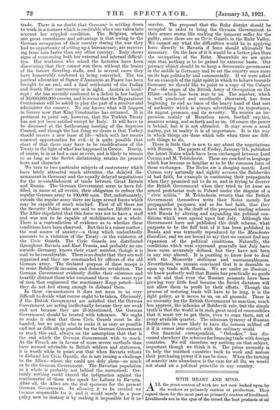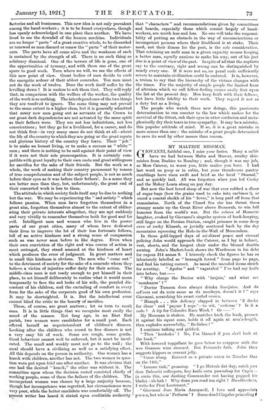WITH HEART AND KIND. A LL the great centres of work
are nct now looked upon by the workers as primarily centres of production. They regard them for the most part as primarily centres of livelihood. Livelihoods are in the eyes of the crowd the best products of all factories and all businesses. This new idea is not only prevalent among the hand-workers ; it is to be found everywhere, though less openly acknowledged in one place than another. We have lived to see the downfall of the human machine. Individuals are no longer " parts " of a great creative whole, to be discarded or renewed as men discard or renew the " parts " of their motor- cars. The parts have all come alive and the weakness of each is sustained by the strength of all. There is no such thing as arbitrary dismissal. One of the terrors of life is gone, one of the opportunities of tyranny, and with them one of the great spurs to good work. Turn where we will, we see the effects of this new point of view. Great bodies of men decide to curb the energetic ardour of their ablest comrades. Ten men must not do the work of twelve. Does the work itself suffer by the levelling down ? It is useless to ask them that. They will reply that, in comparison with the welfare of the worker, the quality of the work is as nothing. The interdependence of the two things they are resolved to ignore. The same thing may not prevail to the same extent in a higher class, but it is generally admitted that many new men going out as servants of the Crown to our great dark dependencies are not actuated by the same spirit as their fathers were. They are not less industrious, not less conscientious ; but they go for a livelihood, for a career, and do not think first—in very many cases do not think at all—about the life of the country to which they are going or the great repute and glorious history of the country they leave. Their " job " is to make an honest living, or to make a success as " white " men ; and there is nothing to be said against their point of view if it were not their sole preoccupation. It is certainly com- patible with great loyalty to their own caste and greatwillingness for sacrifice for the sake of their friends. But the work as a whole, the work of making their country paramount by reason of true comprehension and of the subject people, is not as much before their eyes as it was before their fathers'. In a sense they are better men than they, but, unfortunately, the great end of their concerted work is less to them.
The attitude in which society finds itself may be due to nothing but the war. We may be experiencing the " sad satiety " which follows passion. When men have forgotten themselves in a great aim, forgotten themselves almost to the extent of obliter- ating their private interests altogether, they are apt suddenly and very vividly to remember themselves both for good and for evil. Intelligent men and women who live in the poorer parts of our great cities, many of whom have dedicated their lives to improve the lot of their less fortunate fellows, tell of an active kindness and a strong sense of compassion such as was never seen before in like degree. Even when their own conviction of the right and wise course of action is most outraged, they stand amazed at the kindness of heart which produces the error of judgment. In great matters and in small this kindness is obvious. The men who " come out '' to the detriment of society for the sake of a comrade whom they believe a victim of injustice suffer daily for their action. The middle-class man is not ready enough to put himself in their place, to set himself deliberately to realize what it would mean temporarily to face the sad looks of his wife, the puzzled dis- content of his children, and the curtailing of comfort in every form for the sake of the corporate good of his own profession. It may be shortsighted. It is. But the intellectual error cannot blind the critic to the beauty of sacrifice.
These, of course, are great matters ; let us turn to small ones. It is in little things that we recognize most easily the mood of the masses. Not long ago, in an East End parish, two women were candidates for a small post. Each offered herself as superintendent of children's dinners. Looking after the children who crowd to free dinners is not a very easy bit of work. Some are rough, some gentle. Good behaviour cannot well be enforced, but it must be incul- cated. The small and weakly must not go to the wall ; the meal should have a civilizing as well as a satisfying effect. All this depends on the person in authority. One woman has a knack with children, another has not. The two women in ques- tion were put upon trial one after another. It was obvious that one had the desired " knack," the other was without it. The committee upon whom the decision rested consisted chiefly of working people, some of them the fathers of the children. The incompetent woman was chosen by a large majority because, though her incompetence was regretted, her circumstances were very poor, while the better candidate was comfortably off. The present writer has heard it stated upon creditable authority that " characters " and recommendations given by committees and boards, especially those which consist largely of hand- workers, are worth less and less. No one will take the responsi- bility of putting an obstacle in the way of unoonscientious or incompetent persons where their livelihood is at stake. Their need, not their fitness for the post, is the solo consideration. That retaining an unfit man in a given capacity means keeping a better man, equally anxious to make his way, out of his just due is a point of view of the past. In spite of all that the sophists say to the contrary, right and wrong can be distinguished by nearly every one. If it were not so, no penal code sufficiently severe to maintain civilization could be endured. It is, however, a truism to say that the hierarchy of the virtues changes with the times. For the majority of simple people the limited form of altruism which we call fellow-feeling comes easily first upon the list at the present day. Men keep faith with their fellows, but have little fidelity to their work. They regard it not as a duty but as a living.
The people who watch these new doings, this passionate determination to run counter to the law which makes for the survival of the fittest, rub their eyes in utter confusion and meta- phorically dry their tears in true sympathy. It may be a mistake, this popular attitude of mind. If so, it is a great mistake in more senses than one : the mistake of a great people determined to save its soul by other means than reason.































 Previous page
Previous page